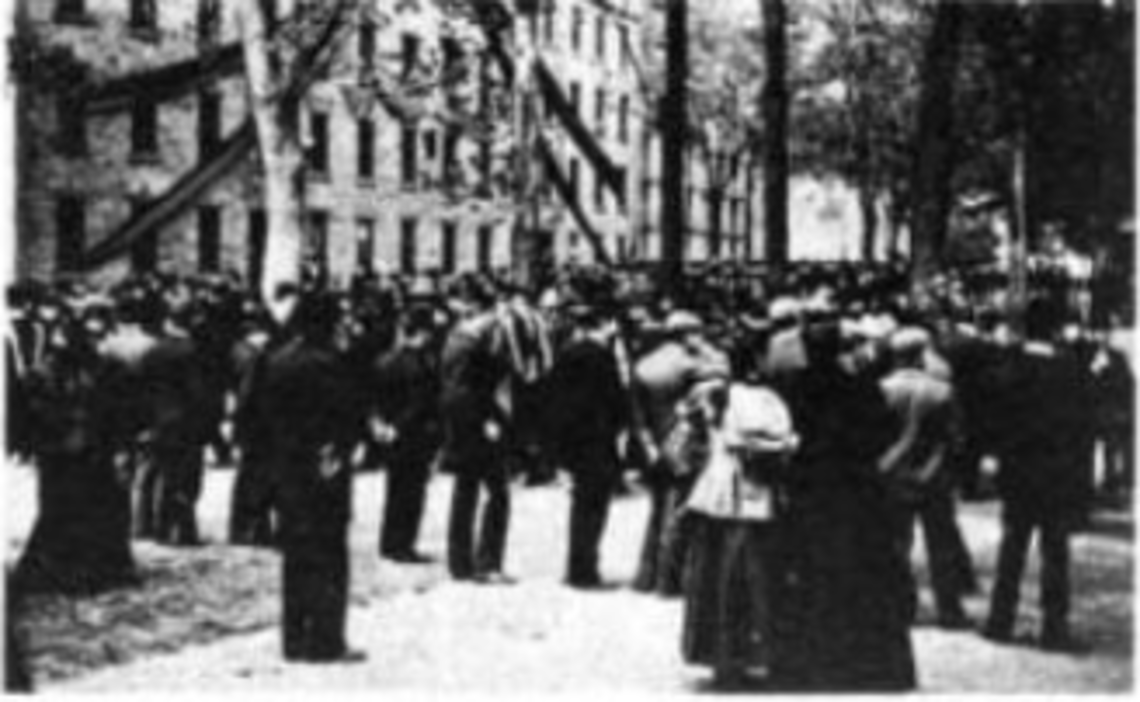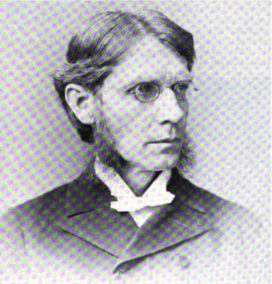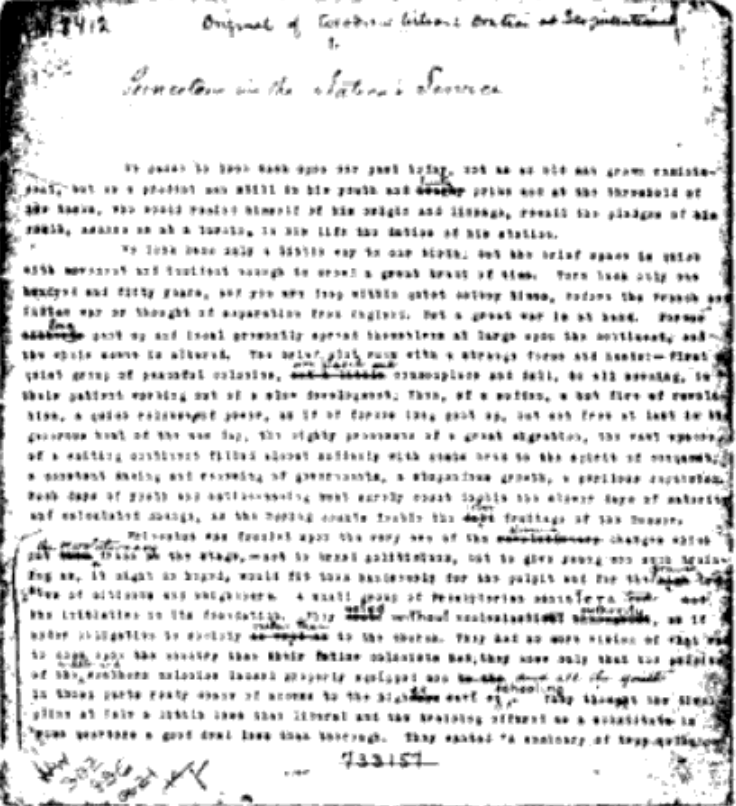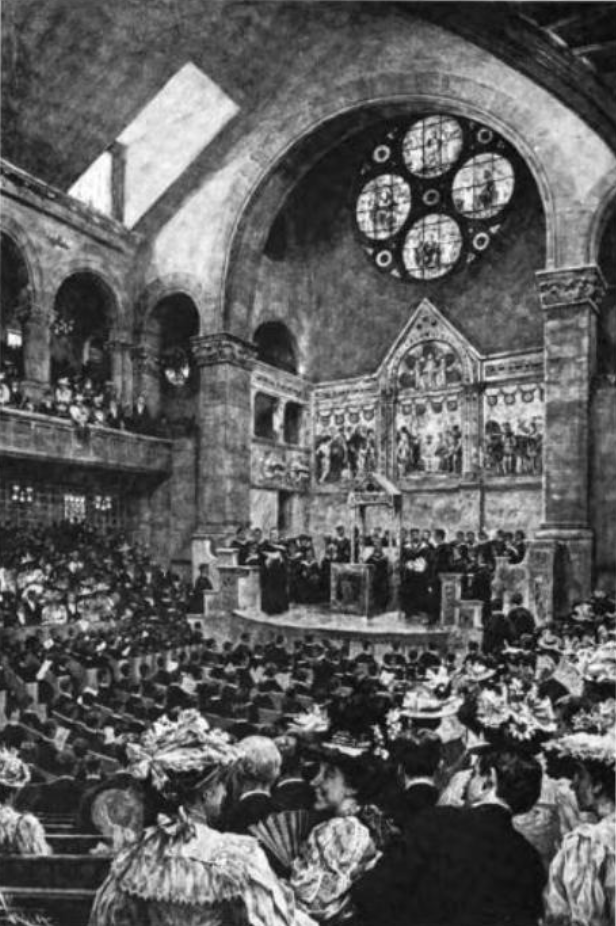Princeton in Whose Service? Breaking Down Woodrow Wilson ’79’s Famous Phrase
Woodrow Wilson’s Famous Phrase Has Come to Mean Much More Than He Intended

Theodore Ziolkowski, the Class of 1900 Professor of Modern Languages and a professor of comparative literature and Germanic languages and literatures, has been dean of the Graduate School since 1979. His most recent book is German Romanticism and Its Institutions (Princeton University Press, 1990).
Ever since 1896, when Woodrow Wilson formulated the phrase, “Princeton in the Nation’s Service” has often been regarded as the unofficial motto of the university. At fundraising time, “the nation” has seemed to be a more promising source than the authority designated in the official motto on the university’s seal, Dei sub numine viget (Under God’ power she flourishes). During World War II, Annual Giving sent out orange cards captioned “Princeton in the Nation’s Service,” assuring that “The Trustees, Administration, and Faculty of Princeton University conceive her role as one of complete cooperation with all demands on her facilities.” In the early 1980s, the case statement for A Campaign for Princeton reminded potential donors that “Wilson’s eloquent essay…suggested not just an opportunity, but an obligation, to apply one’s learning to the affairs of the world.”
Over the years, “service” has come to be understood in the widest possible sense. The Woodrow Wilson Award, bestowed annually on the alumnus who best exemplifies Wilson’s conception of “Princeton in the Nation’s Service,” has been presented to physicians, physicists, philanthropists, and movie stars, among other servants of the people. Popularly, the phrase has been applied even more broadly. An editorial in The Princeton Sentinel, a newspaper of conservative student opinion, invoked it in defense of R.O.T.C.’s presence on the campus.
In short, uses for Wilson’s famous phrase have been limited only by the ingenuity of the users. But are these uses appropriate? If we seek to recapture Wilson’s own understanding of his phrase, we need first of all to locate it in context. “Princeton in the Nation’s Service” was the title of his oration at the celebration of the university’s sesquicentennial, on October 20, 21, and 22, 1896, one of the most spectacular academic festivals ever held on this side of the Atlantic. Two years in the planning, the extravaganza was preceded by a week of lectures by six distinguished scholars from Europe. Recalling the event several years later in a 475-page memorial book, Professor George Maclean Harper 1884 wrote, “Nature herself had donned Princeton colors” for the occasion. Two huge triumphal arches were erected on Nassau Street – a copy of the Arch of Trajan and a model of Manhattan’s Washington Arch. The latter bore inscriptions in Latin bidding farewell to the College of New Jersey and greeting Princeton University, as the college was to be renamed.
Each morning at 10:30, an academic processions, which included representatives from seventy-seven educational institutions of the United States and Europe, formed in Marquand Chapel and then marched to Alexander Hall for the day’s events. The first program featured a sermon by President Francis L. Patton, “Religion and the University,” followed by a presentation of the delegates and a performance of, among other works, Brahms’s Academic Festival Overture. The second day opened with literary performances sponsored by the Whig and Cliosophic societies, and in the afternoon Princeton defeated Virginia, 48-0, in a football game. That evening, the President of the United States, Grover Cleveland, reviewed an elaborately orchestrated torchlight procession from the steps of Nassau Hall.
At the formal celebration of the sesquicentennial, on October 22, President Patton’s announcement that the College of New Jersey “shall in all future time be known as Princeton University” prompted the audience, according to Harper, to break into “immense applause, which settled into deep, concerted, shattering cheering.” In the name of the new university, and with the Latin formula still used today, Patton capped the ceremony by awarding fifty-eight honorary doctorates. President Cleveland, for whom a reception was held that afternoon at Prospect, was so attracted to the university and the community by the events of those October days that he retired to Princeton after he left office the following year.
Wilson gave the address entitled “Princeton in the Nation’s Service” on the morning of the second day. He shared the dais with Henry van Dyke 1873, a professor of literature who, representing the Cliosophic Society, recited his ode “The Builders.” Wilson, a professor of jurisprudence, had been active in the Whig Society during his undergraduate years and was the obvious choice to represent that organization. A charismatic lecturer who enjoyed an almost cultlike following among students – they routinely voted him the most popular teacher on the faculty – the thirty-nine-year-old Wilson was also a national figure celebrated for his high-minded (albeit often unscholarly) lectures, magazine articles, and biographies. The sesquicentennial provided him with an ideal opportunity to strut his stuff before a distinguished international audience. In a letter, Wilson’s wife, Ellen, reported of his speech that famous men from all parts of Europe “declared there had been ‘nothing to equal it since Burke.’” Princetonians, she added, “simply fell on his neck and wept for joy. They say that those who could not get at Woodrow were shaking each others hands and congratulating each other in a perfect frenzy of delight that Princeton had so covered herself with glory before the visitors.”

It is only this first half of the oration that in any strict sense justifies the speech’s title. But this part was composed almost by prescription to fulfill its expected function: the sesquicentennial celebration, after all, had to include a survey of the institution’s past. But it was not the historical elegy that most concerned Wilson and excited his listeners. Writing in his diary, Horace Elisha Scudder summarized Wilson’s address as “a well considered historical discourse closing with a strong plea for the humanities in the college course.” Another listener, Henry Newell Hoxie, a teacher at the Haverford School, congratulated Wilson on “the bright & stirring outline of the college history”; but what impressed him most was Wilson’s stress on “the higher civilizing influences of Europe” and his “reference to the worth of the classic literatures.”
In the second part, which constitutes the thematic core of the oration, Wilson pointed out that while the Revolution produced “a radical work of change in the world,” it also was “a work of conservation.” In a profound sense, his oration can be called the same. Progress is life, he observed, but “not all change is progress, not all growth is the manifestation of life. Let one part of the body be in haste to outgrow the rest and you have malignant disease, the threat of death.” Thus, “the College should serve the state as its organ of recollection, its seat of vital memory.” Men who aspire to leadership must be able to calculate the probabilities of failure and success, to distinguish the permanent from the fleeting, to understand the principles according to which others have lived. The right preparation for leadership in the world, therefore, is “the catholic study of the world’s literature as a record of spirit.” Anticipating Santayana’s famous aphorism, Wilson argued that it is essential to keep alive the world’s memory, “or we shall never see an end of its old mistakes.” He saw as the greatest danger in the present the loss of contact with the lessons of the past. “In America, especially, we run perpetually this risk of newness.” The danger was more immediate in the 1890s than during the Revolutionary era, he said, because the “men whom Madison led in the making of the Constitution were men who regarded the past.” It is the responsibility of universities in a free society “not merely to implant a sense of duty, but to illuminate duty by every lesson that can be drawn out of the past.” No one can consider himself knowledgeable about the world of affairs who knows “only that little last segment of it which we call the present.”
The best means of retaining the inherited wisdom of the past, Wilson continued, was “the intimate study of the ancient classics” – by which he meant the literature of Rome and Greece. (He specifically cited the authors he had been required to study as an undergraduate: Plato, Vergil, Horace, and Tacitus.) The admirer of Burke and Macaulay also included in his curriculum the rhetorical classics of English literature. And the professor of jurisprudence proclaimed his belief in “full, explicit instruction in history and in politics, in the experiences of peoples and the fortunes of governments.”

What prompted these responses? In his oration, Wilson acknowledged “the extraordinary advances in physical science which this great age has witnessed,” conceding that anyone who begrudged science its proper triumph would be a “barbarian” and a “lover of darkness.” But he believed that the scientific spirit had produced a “great degeneracy.” For science, in its arrogance of success, had engendered a “spirit of experiment” accompanied by a “contempt for the past.” Wilson stressed that he was not pronouncing an indictment against science as such. “I have only a warning to utter against the atmosphere which has stolen from laboratories into lecture rooms and into the general air of the world at large.” It had not only “drive mystery out of the Universe” but had infected other disciplines. Even the study of the classics, he lamented, had begun to sell out to “the phenomena of language” rather than “the movement of spirit.”
But “worst of all,” said Wilson, we believe in the present and in the future more than in the past, and deem the newest theory of society the likeliest.” He trembled at the thought of social reform, he went on, “led by men who have breathed” the “noxious, intoxicating gas” of science. Fearing “nothing better than utter destruction from a revolution conceived and led in the scientific spirit,” Wilson added, that, although science may have liberated us from superstition and disease, “it has not freed us from ourselves.” Rather, by making wealth too easily attainable, it has merely intensified our ambitions.
Wilson’s reasoning – which strikingly anticipated the arguments of such educational conservatives of the 1980s as Allan Bloom and Lynne Cheney – led him to ask in his peroration for “the old drill, the old memory of times gone by, the old schooling in precedent and tradition, the old keeping of faith with the past, as a preparation for leadership in days of social change.” While conceding science a modest place in the curriculum, he asserted that we must, above all, “make the humanities human again.”
In his closing paragraphs, Wilson recalled his initial theme, concluding that “it is not learning but the spirit of service that will give a college place in the public annals of the nation.” He spoke of “the compulsion of the national life” and “the rough ways of democracy.” For Wilson in 1896, “the perfect place of learning” was a little world apart, “a place removed, - calm Science seated there, recluse, ascetic, like a nun, not knowing that the world passes, not caring, if the truth but come in answer to her prayer; and Literature, walking within her open doors, in quiet chambers, with men of olden times, storied walls about her, and calm voices infinitely sweet.” Wilson’s university, in other words, is not in the world, even though, in the image so dear to him, it has windows that “open straight upon the street,” where action takes place. It is a place where we “learn the truth about the past” but merely “hold debate about the affairs of the present, with knowledge and without passion.” The university, in short, is a place for introspection, not extroversion. “Who,” he cries in his closing sentence, “shall show us the way to this place?”
As his audience well understood, Wilson had intentions quite different from those often attributed to him by readers who project onto the grand oration their consciousness of subsequent events: Wilson’s creation of the preceptorial method of instruction, his crusade against the eating clubs, his battle over the Graduate College, and his political career. Wilson, not yet a university president or a politician, was an academic speaking to a distinguished audience of American and European scholars. For contemporary listeners, his oration amounted to a major statement in the great educational debate of the 1890s (see Laurence R. Veysey’s The Emergence of the American University [1965]). Some of the issues in this debate were the vocationalism of the land-grant institutions versus the “liberal culture” of many private colleges; the new “research” imported from Germany to such aspiring universities as Johns Hopkins versus the stadium generale of undergraduate colleges; required study of Greek and Latin versus the modern languages, which had recently asserted themselves through the establishment, in 1883, of the Modern Language Association; free electives according to the Harvard model versus the strict curriculum of Princeton; specialization versus a synthesizing general education; the nonpaternalistic arrangements at universities that, following the European model, provided no common housing for their students versus the collegiate system in loco parentis based on the English model.
Most of these issues are either explicit or implicit in Wilson’s oration. Only a decade earlier, James McCosh, Princeton’s president from 1868 to 1888, had raised one of the most articulate voices in the debate surrounding the revolutionary elective system at Harvard. “If your colleges discard Latin and Greek,” he said, “the whole ancient world with its thoughts and deeds will remain very much unknown even to our educated men.” In a pamphlet entitled The New Departure in College Education (1884), McCosh gloated: “I am glad that things have come to a crisis,” for friends of education would now discover what was going on. “Tell it not in Berlin or Oxford that the once most illustrious university in America no longer requires its graduates to know the most perfect language, the grandest literature, the most elevated thinking of all antiquity.”
Wilson, himself a product of McCosh’s Princeton, echoed these sentiments regarding the classics, which he saw as besieged from two directions. First was the threat of the modern languages. Although he took (or more often cut) Joseph Kargé’s French recitations and later learned enough German to decipher the standard works on legal administration that constituted his principal sources, Wilson was never comfortable with modern languages. Christian Gauss once wrote to Edmund Wilson ’16 (no relation to Woodrow) that “He was more than usually ignorant of European civilization and literature as it exists outside of England.” And Freud, in the “psychological study” of Wilson that he wrote with William C. Bullitt, repeatedly speaks of his “comprehensive dislike of France, Germany and Italy,” arguing that Wilson was “cut off from direct contact with European life by his ignorance of European languages.”
It was consistent with this view that, besides Greek and Latin, Wilson made a place in his ideal curriculum only for English literature – and an essentially rhetorical English not debased by the new philological spirit imported from Germany. Wilson was reflecting a view widespread at the time and expressed most often, perhaps, in the battle of liberal humanists against the encroachment of the Ph.D. on the liberal arts. In Literature and the American College (1908), Irving Babbitt bemoaned “the fetish worship of the doctor’s degree on the part of certain college presidents,” arguing that “this acceptance of the doctor’s degree as proof of fitness for a chair of literature…is doing more than any one thing to dehumanize literary study and fix on our colleges a philological despotism.”
But Wilson had in sight a broader target than the modern languages and what he saw as the philological debasement of the classics. He was taking a stand against the many American colleges that, at the end of the nineteenth century, were seeking to transform themselves into research universities on the model of the great German institutions. Wilson himself almost failed to obtain his Ph.D. because he could not adjust to the German research methods that dominated historical seminars at Johns Hopkins. This shift was taking place mainly in the sciences, because the Ph.D. was regarded, initially at least in the United States, as training for scientific research. It is no accident that many of the first presidents of the major research institutions were themselves scientists who had studied in Germany: the physical geographer Daniel Coit Gilman at Johns Hopkins, the chemist Charles W. Eliot at Harvard, and the psychologist G. Stanley Hall at Clark University.
In short, Wilson’s oration – particularly its second half, which appealed to most of his listeners – was intended to be a staunch defense of the traditional liberal arts against the trend toward modern languages that was undermining the classics, against the scientific methods of research that underlie the modern American university, and against the movement toward theory and method that presaged the neglect of history as ethical narrative.
Certainly, with his famous phrase, Wilson did not mean to suggest anything like today’s Woodrow Wilson School of Public and International Affairs, where students learn about countries that hardly entered the intellectual ken of a man uncomfortable even in Western Europe. The off-campus internships in which students at the Wilson School participate would have stuck him as suspiciously utilitarian. As Wilson wrote in Mere Literature and Other Essays, a book published in the year of the sesquicentennial, “There is more of a nation’s politics to be got out of the poetry than out of all its systematic writers upon public affairs and constitutions.” It is no accident that Wilson was fond in his rhetoric of spatial images like windows and doors and quadrangles; at this point, well over a decade before he evolved his politically motivated “democratic” theory of education, he still clung to his belief in the university as an elite institution closed off from the outside world, a place where the student could remain detached and aloof, gazing through the window at an external reality that, properly fortified by an education in the traditional liberal arts, he might later enter.
For this reason, the ecstatic letters that Wilson received after the oration amount to a roll call of the educational conservatives of the day. The few dissenting voices came from scientists like Ira Remsen, a professor of chemistry who was soon to become the president of Johns Hopkins. By means of his oration, Wilson was consciously positioning himself on the conservative side in the controversy between the ancient and the modern, between the humanities and the sciences, between history and theory, between liberal culture and vocationalism. Princeton in the nation’s service? Perhaps. But through a traditional liberal arts curriculum rather than the progressive educational initiatives taking place elsewhere in the country. Certainly, however, Princeton in the Wilson’s service. For the rhetorical flourish of the last sentence made it quite clear that, with regard to the future leadership of the newly named university, he was proposing himself as the most suitable person to “show us the way to this place.” He was not to be disappointed.
Six years later, Wilson returned to the same topic under almost the same title in his inaugural address as the university’s president, “Princeton for the Nation’s Service.” This address amounts to a rhetorical inversion of the sesquicentennial oration: it ends with praise for Witherspoon’s Revolutionary Princeton and begins with an ode to service. “The service of institutions of learning is not private but public…[The nation] needs efficient and enlightened men. The universities of the country must take part in supplying them.”
But having stated his theme, Wilson reiterates the familiar message of liberal culture. To be sure, as president rather than professor he must now take a larger view of the institution. He grudgingly concedes a place in his university to electrical engineering, “upon which the skilled industry of the modern world is built up,” but he emphasizes the secondary status of professional schools. “Though the university may dispense with professional schools, professional schools may not dispense with the university. Professional schools have nowhere their right atmosphere and association except where they are parts of a university and share its spirit and method.” He makes room for the modern languages (to which, as president, he would soon grant the status of a department) – not as ends in themselves but merely as “tools of scholarship.” And he yields a larger role to science, “because science has had its credentials accepted as of the true patriciate of learning.” Indeed, physics and chemistry offer a body of knowledge “as definitive almost, as mathematics itself.” But science, the modern languages, and other concessions to modernity must be kept within bounds. “We must observe proportion and remember what it is that we seek.”
What Wilson sought is still precisely what he advocated in the sesquicentennial oration: “a catholic appreciation of the best achievements of men and the best processes of thought since days of thought set in.” In its quest for knowledge, civilization had lost “system,” by which Wilson meant coherence and synthesis. This synthesis would be best restored by way of the “fundamental studies,” by which he meant history and philosophy and literature – “the old discipline of Greek, Latin, Mathematics, and English” enlarged, within reason, by science and the modern tongues.
This is what Wilson meant by service. “It is serving the nation to give men the enlightenments of a general training.” To achieve this final synthesis, “men must for a little while withdraw from action.” Wilson’s university, the “quiet place of remove from the bustle of actions,” has changed little from his image of 1896, and it’s a frankly elitist institution – “not for the majority who carry forward the common labour of the world” but “for the minority who plan, who conceive, who superintend, who mediate between group and group and must see the wide stage as a whole.”
Wilson delivered both these great orations in Alexander Hall, beneath the south window of which a Latin inscription speaks of “serene temples informed by the teachings of the wise.” These lines from Lucretius reflect Wilson’s elitist view of Princeton as a place detached from the outside world, an institution where young men prepared themselves for life and leadership by studying philosophy, history, and the literature of antiquity, with a carefully controlled measure of science and modern languages. A curriculum in the nation’s service, yes – but hardly one that would satisfy the students and faculty of today’s Princeton, with its distinguished departments of science and modern languages, its powerful graduate school, its noted professional schools, and its diverse student body.
The appropriation of Wilson’s phrase for such a variety of purposes, from justifying professional schools to supporting military recruitment, tells us a good deal about the nature of language, both its resilience and its incantatory power. It is perfectly permissible to use those magic words for our purposes today, so long as we remember that they no longer mean what Wilson intended. At the same time, this rhetorical exercise should caution us to pay critical attention whenever anyone seeks to manipulate our minds with slogans and quotations, no matter how revered their sources.
This was originally published in the January 23, 1991 issue of PAW.













0 Responses